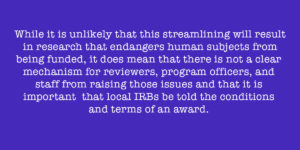by Craig Klugman, Ph.D.
On February 16, 2018, bioethics.net received an NIH memo sent to program officers on the same day. The missive came from the NIH OER Communications Office and was signed by Michael S. Lauer, MD, the NIH Deputy Director for Extramural Research:
Effective Tuesday February 20, 2018, NIH is changing how we handle pre-award human subject concerns identified during peer review to streamline administrative processes associated with making grant and R&D contract awards. Responsibility for review and approval of finalized human subjects’ research protocols vests with the Institutional Review Board (IRB) of record. The NIH Office of Extramural Research (OER) will no longer be involved in the resolution of human subject concerns.
Another source reports that this change is a result of the Trump Administration’s “Executive Order to reduce bureaucracy.” Technically, the change is a retirement of codes 44 and 54. These codes could applied to grant applications by reviewers to raise concerns about human subjects in the research. According to the NIH’s Policy Manual:
For grant applications and contract proposals that have been identified as having human subjects concerns (Code 44), which is a bar to funding unless issues can be resolved and the code updated, these concerns must be brought to the attention of OEP and need to be resolved prior to making an award. Such concerns typically are raised by the Scientific Review Group, but also may be raised by NIH Staff or an Institute or Center (IC) Council.
Once the concerns are fully resolved, then a code of 54 is applied. Instead, the memo says that all applications with human subjects concerns will be given a code of 48:
Restricted award with terms and conditions which may be resolved and recoded through OEP action. An award can be made with unresolved human subjects protection concerns; terms restricting all human subjects research must be included on the Notice of Award (NoA) or the Terms of the Contract
Before February 20, an identified concern of human subjects research would have led to the NIH taking action to resolve the issue. Now, the presumption is that local IRBs have reviewed and approved the research proposal and would have found all concerns about human subjects. While most IRBs are thorough, use subject experts, and would find any concerns, an NIH scientific reviewer might have a special expertise that the IRB did not and thus might find a concern that others would have not seen. One way to think about this is that the NIH served as a proofreader on proposed human subjects research, but that second look has now been removed.
 The NIH does sometimes changes its mechanisms and as that information moves down the line, adjustments are made. In this case, institutional IRB may need to be sure it receives copies of NoAs and Contracts to see if there is a 54 code that could indicate an unresolved human subjects issue. However, in this circumstance, our source believes that there is no plan proactively inform IRBs of this change, that has already occurred.
The NIH does sometimes changes its mechanisms and as that information moves down the line, adjustments are made. In this case, institutional IRB may need to be sure it receives copies of NoAs and Contracts to see if there is a 54 code that could indicate an unresolved human subjects issue. However, in this circumstance, our source believes that there is no plan proactively inform IRBs of this change, that has already occurred.
I reached out to 3 people who serve on review panels and none of them had been informed of this new policy. I will update this article if they report back to any information. One said they had a training meeting this week and would raise the issue.
I did reach out to several MIH offices, including the memo’s author, to verify this change. The NIH Office of Extramural Research replied to me with the following statement:
NIH has long required, and will continue to require, that human-subjects research be funded only if it can certify that the research has been approved by a OHRP-assured Institutional Review Board. NIH also requires its staff to address human-subjects’ protections concerns that arise post-award. NIH has simplified and streamlined some of its internal pre-award administrative processes…NIH program staff will continue to consider human subject concerns that are identified during peer review, and can continue to reach out to the applicant to obtain information needed to help prioritize human subjects research funding decisions.
The difference in the new process from the old is a change in code and that “The NIH Office of Extramural Research (OER) will no longer be involved in the resolution of human subject concerns.” So there may be differences in how human subjects issues are handled during review. The NIH will not connect with the local IRBs. The difference between “can continue to teach out” and “will no longer be involved in the resolution” is a large space and only time will tell how this change affects research and review. It is unlikely that this streamlining will result in research that endangers human subjects from being funded and it may mean that IRBs will want to re-review a restricted protocol and grant application to ensure that indeed, all potential human subjects concerns were identified and resolved.
With the adoption of the new combined human subjects and clinical trial form for grant reviews (as of January 25), the change may not be drastic. In fact, the new application puts all human subjects materials in one place and it requires all human subject information to be attached.